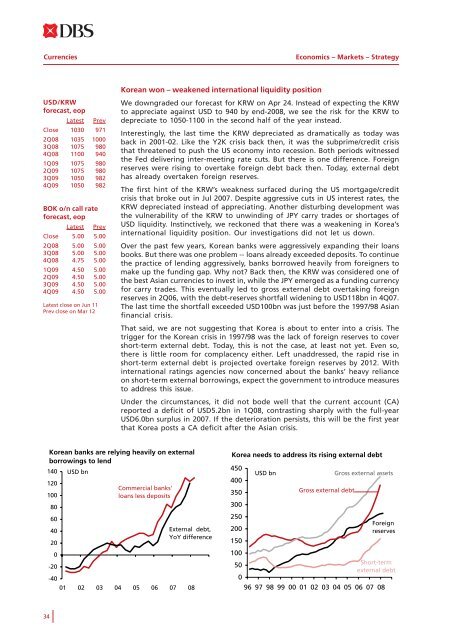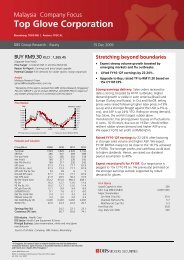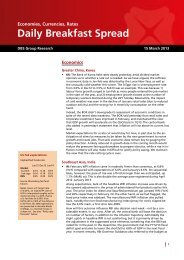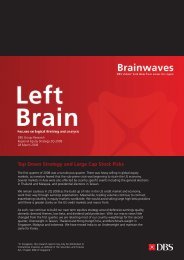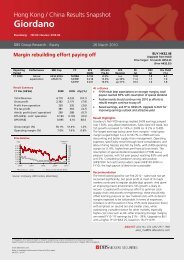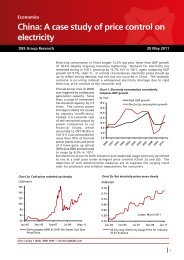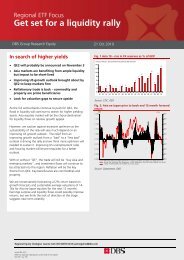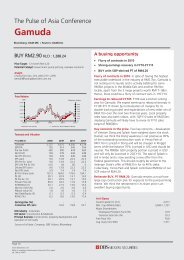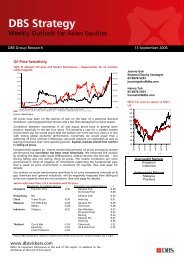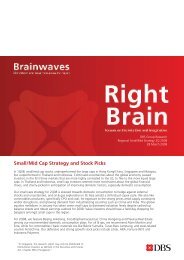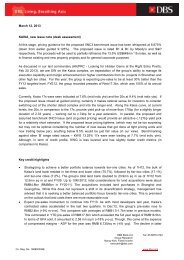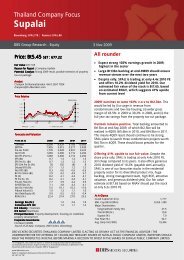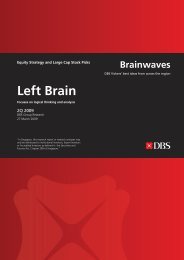Economics Markets Strategy - the DBS Vickers Securities Equities ...
Economics Markets Strategy - the DBS Vickers Securities Equities ...
Economics Markets Strategy - the DBS Vickers Securities Equities ...
Create successful ePaper yourself
Turn your PDF publications into a flip-book with our unique Google optimized e-Paper software.
Currencies<br />
<strong>Economics</strong> – <strong>Markets</strong> – <strong>Strategy</strong><br />
USD/KRW<br />
forecast, eop<br />
Latest Prev<br />
Close 1030 971<br />
2Q08 1035 1000<br />
3Q08 1075 980<br />
4Q08 1100 940<br />
1Q09 1075 980<br />
2Q09 1075 980<br />
3Q09 1050 982<br />
4Q09 1050 982<br />
BOK o/n call rate<br />
forecast, eop<br />
Latest Prev<br />
Close 5.00 5.00<br />
2Q08 5.00 5.00<br />
3Q08 5.00 5.00<br />
4Q08 4.75 5.00<br />
1Q09 4.50 5.00<br />
2Q09 4.50 5.00<br />
3Q09 4.50 5.00<br />
4Q09 4.50 5.00<br />
Latest close on Jun 11<br />
Prev close on Mar 12<br />
Korean won – weakened international liquidity position<br />
We downgraded our forecast for KRW on Apr 24. Instead of expecting <strong>the</strong> KRW<br />
to appreciate against USD to 940 by end-2008, we see <strong>the</strong> risk for <strong>the</strong> KRW to<br />
depreciate to 1050-1100 in <strong>the</strong> second half of <strong>the</strong> year instead.<br />
Interestingly, <strong>the</strong> last time <strong>the</strong> KRW depreciated as dramatically as today was<br />
back in 2001-02. Like <strong>the</strong> Y2K crisis back <strong>the</strong>n, it was <strong>the</strong> subprime/credit crisis<br />
that threatened to push <strong>the</strong> US economy into recession. Both periods witnessed<br />
<strong>the</strong> Fed delivering inter-meeting rate cuts. But <strong>the</strong>re is one difference. Foreign<br />
reserves were rising to overtake foreign debt back <strong>the</strong>n. Today, external debt<br />
has already overtaken foreign reserves.<br />
The first hint of <strong>the</strong> KRW’s weakness surfaced during <strong>the</strong> US mortgage/credit<br />
crisis that broke out in Jul 2007. Despite aggressive cuts in US interest rates, <strong>the</strong><br />
KRW depreciated instead of appreciating. Ano<strong>the</strong>r disturbing development was<br />
<strong>the</strong> vulnerability of <strong>the</strong> KRW to unwinding of JPY carry trades or shortages of<br />
USD liquidity. Instinctively, we reckoned that <strong>the</strong>re was a weakening in Korea’s<br />
international liquidity position. Our investigations did not let us down.<br />
Over <strong>the</strong> past few years, Korean banks were aggressively expanding <strong>the</strong>ir loans<br />
books. But <strong>the</strong>re was one problem -- loans already exceeded deposits. To continue<br />
<strong>the</strong> practice of lending aggressively, banks borrowed heavily from foreigners to<br />
make up <strong>the</strong> funding gap. Why not? Back <strong>the</strong>n, <strong>the</strong> KRW was considered one of<br />
<strong>the</strong> best Asian currencies to invest in, while <strong>the</strong> JPY emerged as a funding currency<br />
for carry trades. This eventually led to gross external debt overtaking foreign<br />
reserves in 2Q06, with <strong>the</strong> debt-reserves shortfall widening to USD118bn in 4Q07.<br />
The last time <strong>the</strong> shortfall exceeded USD100bn was just before <strong>the</strong> 1997/98 Asian<br />
financial crisis.<br />
That said, we are not suggesting that Korea is about to enter into a crisis. The<br />
trigger for <strong>the</strong> Korean crisis in 1997/98 was <strong>the</strong> lack of foreign reserves to cover<br />
short-term external debt. Today, this is not <strong>the</strong> case, at least not yet. Even so,<br />
<strong>the</strong>re is little room for complacency ei<strong>the</strong>r. Left unaddressed, <strong>the</strong> rapid rise in<br />
short-term external debt is projected overtake foreign reserves by 2012. With<br />
international ratings agencies now concerned about <strong>the</strong> banks’ heavy reliance<br />
on short-term external borrowings, expect <strong>the</strong> government to introduce measures<br />
to address this issue.<br />
Under <strong>the</strong> circumstances, it did not bode well that <strong>the</strong> current account (CA)<br />
reported a deficit of USD5.2bn in 1Q08, contrasting sharply with <strong>the</strong> full-year<br />
USD6.0bn surplus in 2007. If <strong>the</strong> deterioration persists, this will be <strong>the</strong> first year<br />
that Korea posts a CA deficit after <strong>the</strong> Asian crisis.<br />
Korean banks are relying heavily on external<br />
borrowings to lend<br />
140 USD bn<br />
120<br />
100<br />
80<br />
60<br />
40<br />
20<br />
0<br />
-20<br />
-40<br />
Commercial banks'<br />
loans less deposits<br />
External debt,<br />
YoY difference<br />
01 02 03 04 05 06 07 08<br />
Korea needs to address its rising external debt<br />
450<br />
400<br />
350<br />
300<br />
250<br />
200<br />
150<br />
100<br />
50<br />
0<br />
USD bn<br />
Gross external debt<br />
Gross external assets<br />
Foreign<br />
reserves<br />
Short-term<br />
external debt<br />
96 97 98 99 00 01 02 03 04 05 06 07 08<br />
34


